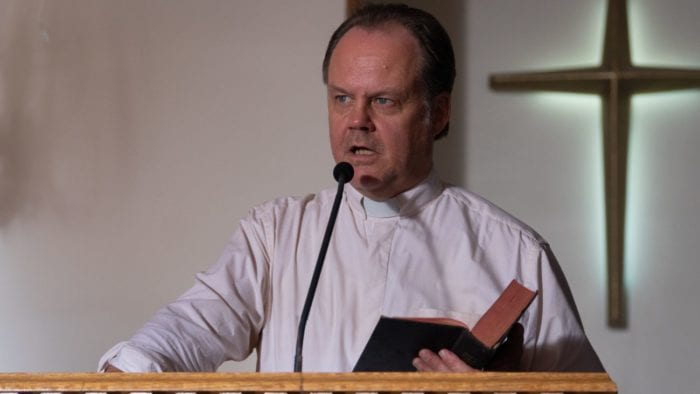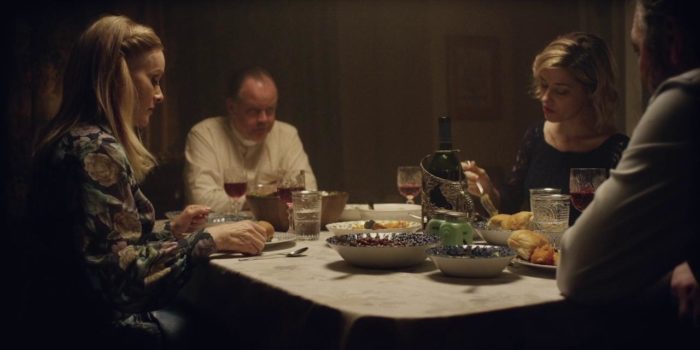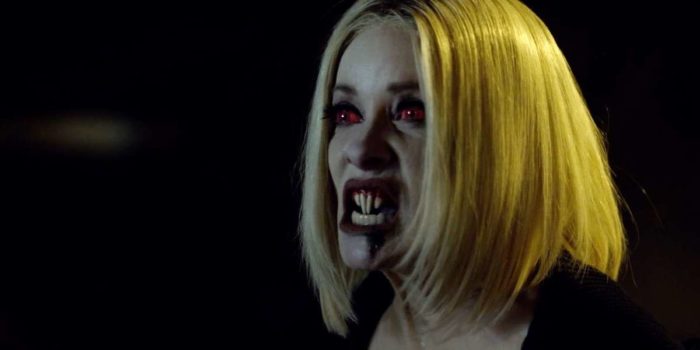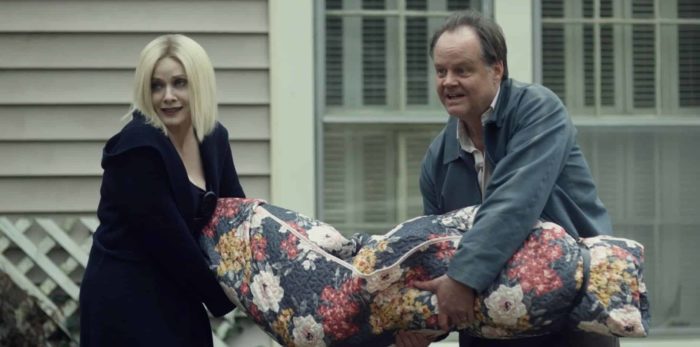When you think about vampires, what’s the first thing that comes to mind? Fangs? Wooden stakes? Drinking blood? Those are all good answers, and if this were an episode of Family Feud, I’m sure we could easily come up with a whole bunch more. But, in this article, I want to go off the beaten path a bit and talk about something almost nobody associates with vampires: marriage. Undead bloodsuckers aren’t exactly known for making lifelong (or undeathlong?) commitments to love “in good times and in bad,” but in the movie Jakob’s Wife, this unexpected theme comes front and center.
The film is about a woman named Anne who’s stuck in a problematic marriage to the titular Jakob. This all begins to change when she gets bitten by a mysterious vampire. She starts to address some of the issues in her relationship, and that in turn shows us what marriage is supposed to be. It’s a really cool story that’s sure to please fans who like a bit of thematic substance mixed in with their scares. So, let’s take a deep dive into Jakob’s Wife and see just what it has to say about the age-old institution of marriage.
“Love Your Wife”

Jakob’s Wife begins at a church service where Jakob, a minister, is reading a passage from the Bible, one that tells us exactly what this movie is about:
Husbands, love your wife as Christ loved the church, that he might sanctify her. Having cleansed her by the washing of the water of the Word that he might present the church to himself in splendor, without spot or wrinkle or any such thing. That she might be holy and without blemish. In the same way, husbands should love their wives as their own bodies. He who loves his wife loves himself. (Ephesians 5:25-28)
I don’t want to turn this into a Sunday school lecture, but I think it’s important to understand how Jakob’s Wife uses this passage. Aside from setting the stage with the basic fact that husbands are supposed to love their wives (and vice versa, of course, but this movie focuses primarily on the responsibilities of husbands), it also subtly foreshadows the basic conflict that runs throughout the film. See, when Jakob reads it, he leaves out a crucial phrase. The passage actually begins, “Husbands, love your wives [for some reason, Jakob also makes this a singular noun], as Christ loved the church and gave himself up for her, that he might sanctify her.”
Jakob leaves out the phrase “and gave himself up for her,” which refers to Jesus’s death on the cross. Without these words, the passage could seem a bit paternalistic. It might appear to be saying that a husband’s job is to take care of his wife the way Jesus takes care of the Church, which could imply that men are superior to women or that women can’t take care of themselves. But, that’s not what the text is really saying. It’s simply telling husbands to model their love on the sacrifice Jesus made for the Church. That kind of love doesn’t require any sort of inequality between men and women. In fact, it means husbands should put their wives first.
What’s more, right before this message to husbands, there’s also a brief message to wives. All of this is prefaced with a very simple but very important exhortation: “Submit to one another out of reverence for Christ” (Ephesians 5:21). So, when we read the full text, it’s actually counseling spouses to practice a “mutual subjection,” a mutual willingness to love and serve each other, in which neither spouse is superior to the other. This “mutual subjection” was explained by Pope John Paul II in a document called On the Dignity and Vocation of Women.
Now, there’s a lot more we can say about this passage, but for our purposes here, that’s enough. By misquoting the text and leaving out the opening part of it, Jakob’s Wife is subtly telling us what kind of husband Jakob is. He knows he’s supposed to love his wife, but he apparently doesn’t know what that entails. It means he’s supposed to make sacrifices for her and treat her like an equal. But, as the rest of the movie shows, Jakob does pretty much the exact opposite of that.
A Bad Husband

For example, the next day, the police speak to him and Anne about a teenage girl who went missing, and he blatantly talks over her. Even worse, during a scene where they’re having a conversation over breakfast, he barely lifts his eyes from the paper. The only time Jakob looks at his wife is when she mentions an old boyfriend of hers. Even then, he goes back to the newspaper very quickly.
The first act of Jakob’s Wife has numerous scenes like this, so it’s not hard to see that Jakob and Anne’s marriage is on pretty shaky ground. As that opening Bible misquote implies, Jakob is simply a terrible husband. Sure, it doesn’t seem like he’s actively abusing Anne, but he’s obviously very neglectful and dismissive of her. He doesn’t care about her thoughts, feelings, or desires, and it’s not even clear whether he truly loves her. In fact, if genuine spousal love means making sacrifices for his wife and treating her like an equal, then the answer is that he probably doesn’t love her. Jakob just does his own thing without caring what Anne thinks or wants. He doesn’t even have the common courtesy to look up from his newspaper when he talks to her. He seems to only care about himself and treats her more like a servant than a wife.
And, in case there’s any doubt about this, the film confirms it for us a few scenes later. Anne’s old boyfriend comes to town for some work, and the two get together to catch up. We learn from their conversation that she used to have dreams of traveling to exotic places but gave them up when she married Jakob. It’s pretty sad, and even though she says she’s happy with her current life, it’s obvious from the way she says it and the look on her face that she’s really not.
So, once again, it’s all about Jakob. We know Anne gave up her dreams to be with him, but as far as we can tell, he hasn’t given up anything to be with her. Their relationship seems entirely one-sided. Granted, we can’t be 100% sure about that, but Jakob’s Wife doesn’t give us any reason to think otherwise. It appears that being a minister is all Jakob wants to do with his life, so he’s living his dream while Anne has had to sacrifice everything she ever wanted to be his wife.
A Vampiric Turn

But, when Anne is bitten by a vampire, that all begins to change. She becomes much more assertive. She starts doing what she wants instead of what her husband wants. For example, the next morning, she wakes up and puts on an exercise tape without making Jakob breakfast. When he says he’ll just pick something up on the way to work, she simply replies “Fine,” without taking her eyes off the TV.
It’s an obvious callback to his obvious lack of engagement during the breakfast conversation scene. She turns the tables on him in a really cool way, treating him exactly like he treated her. Unsurprisingly, he doesn’t appreciate it.
Similarly, during a scene where they get into a bit of a squabble, Anne doesn’t let Jakob walk all over her, as she did previously. Instead, she tells him that he constantly shuts her down and pushes her aside. When he cuts her short to say that’s not true, she points out that he constantly interrupts her as well.
Again, this is an obvious callback to previous scenes. Anne is standing up for herself and confronting her husband about the things he did in the first act of the film (and their previous 30 years together!). She’s demanding to be treated with dignity and respect. She’s finally realizing that she deserves to be an equal partner in their marriage and is taking an important step toward achieving that equality.
A Better Relationship

After Jakob finds out that Anne is becoming a vampire, their relationship goes through a few ups and downs, but they make some real progress. For instance, there’s a scene where the Master (the vampire who turned Anne) entrances Jakob and gives Anne the opportunity to kill him, but she refuses. Instead, she lets her husband live, and then they have sex.
Significantly, Anne is the one who initiates the sex, and that’s a huge step for her and Jakob. It shows once again that she’s taking some initiative and asserting herself; and, this time, Jakob accepts it. Granted, it’s not surprising that a man would happily have sex with his wife when she’s in the mood, but it’s still an important step in his growth as a genuinely loving husband. He’s learning that Anne is an equal partner in their marriage, and after that, their relationship becomes a lot better. Jakob even apologizes to Anne for talking over her, so it seems like he’s finally learning what it takes to be a good husband.
However, it’s still not entirely smooth sailing after that. When the final scene of Jakob’s Wife comes around, a bit of uncertainty remains in their relationship. At this point in the film, the Master has been killed, but Anne is still a vampire, so Jakob isn’t entirely sure what they should do next. He asks Anne what she thinks, and she says, “Sell the house and just leave. And I want to make my own decisions from now on.” She explains that she likes who she’s become, so she doesn’t want to look for a cure for her vampirism. However, they can still have a happy marriage if they set a few ground rules.
In response, Jakob incredulously asks, “So I’m supposed to trust you?” and they both lean in for a kiss. Somewhat surprisingly though, Anne ominously bares her fangs, and Jakob grips his wooden stake. The movie ends before we see what they intend to do. Will they kill each other, or will they live happily ever after? We don’t know, and the way I see it, that’s exactly the point.
Jakob’s Wife ends on a dangerous and scary note for both of them, and I think that’s a great allegory for marriage. Sure, people shouldn’t be afraid that their spouses will literally kill them, but this image does capture a key truth about what marriage is supposed to be. When the movie began, Jakob was in a very safe position. He pretty much controlled Anne’s life, so he was able to do whatever he wanted without worrying about whether she was happy with it.
However, when your spouse can run their own life and make their own decisions, it’s a whole different ball game. You can’t just do whatever you want without regard for your husband or wife. Instead, you have to take their wants and needs into account and have to be willing to give some things up for their sake. There’s a certain element of risk involved, and you need to trust that your spouse is going to give you that same respect and deference in return.
In other words, the relationship is no longer “safe.” So, the image of Anne and Jakob simply having to trust that they won’t try to kill each other is a great allegory for marriage. It shows that marriage is an equal partnership and that both spouses should get to make their own decisions and contribute in equal measure to the management of their joint life together.



